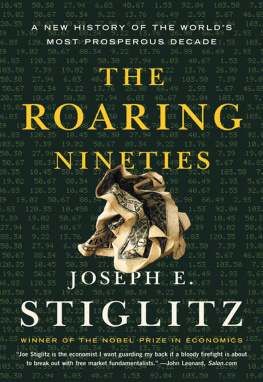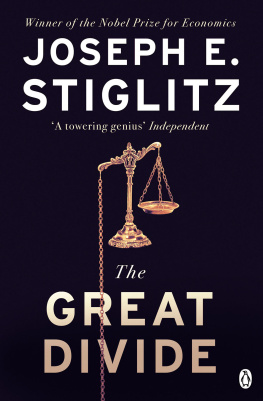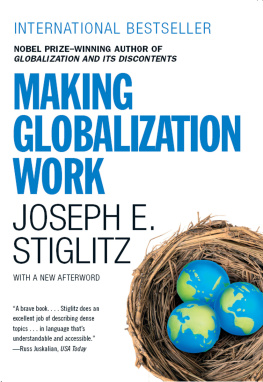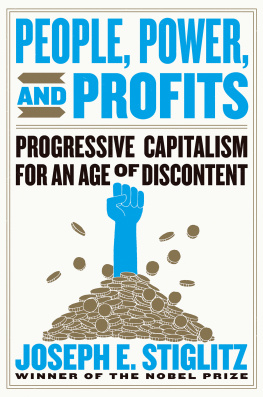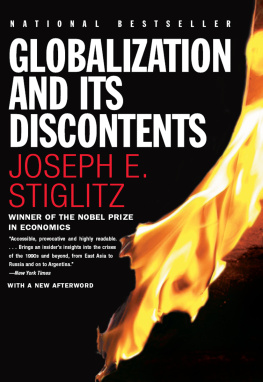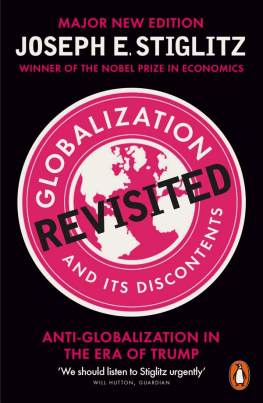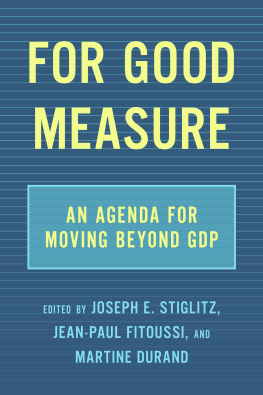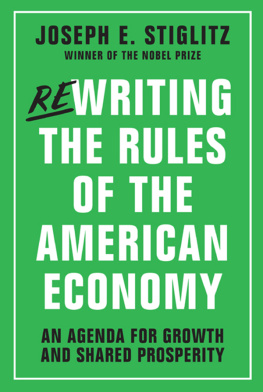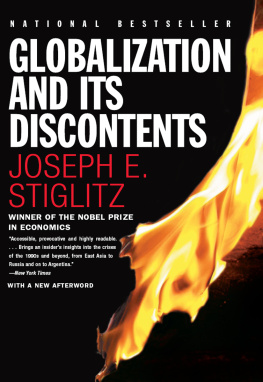JOSEPH E. STIGLITZ
W. W. NORTON & COMPANY
Copyright 2003 by Joseph E. Stiglitz
W. W. Norton & Company, Inc.
500 Fifth Avenue, New York, N.Y. 10110
www.wwnorton.com
W. W. Norton & Company Ltd.
Castle House, 75/76 Wells Street, London W1T 3QT
Preface
J UST A DECADE ago, I left my quiet life in Stanford as a professor of economics to go to Washington, to serve first as a member, then as chairman of President Clintons Council of Economic Advisers. I had spent the previous quarter century doing research on economic theory and economic policy. I wanted to see what really goes onto be a fly on the wall. But I wanted to be more than a fly on the wall. I had entered economics in the sixties, the years of the civil rights and peace movements. I wanted, I suppose, to change the world, but I wasnt sure how; as an academic, I needed to understand the world better first.
Little did I know how much I would learn. By the time I left Washington, having served throughout the first Clinton administration and then three years as senior vice president and chief economist at the World Bank, much had changed. These were the years of the tumultuous, Roaring Ninetiesthe decade of mega-deals and mega-growth. That much is in the public record. But the idea for this book was hatched as I considered stories that were not so widely available, or so well understood. The recovery from the 1991 recession, for instance, seemed to defy what was universally taught in economics courses around the world. The popular version, trumpeted by some within the Clinton administration, claimed that deficit reduction (reducing the gap between the governments expenditures and its taxes) had brought about the recovery, yet standard theory said that deficit reductions worsened economic downturns. To take another example, I had been involved in many battles over deregulation and accounting and thought that particularly with banking deregulation, we pushed too far. We had also missed opportunities to improve corporate accounting. More generally, the decade marked the emergence of the so-called New Economy, with the rate of productivity increases doubling, or tripling, what it had been for the preceding two decades. The economics of innovation had been one of my fields of specialization as an academic, and it was important, I thought, to get a better grasp of what had caused the enormous slowdown in productivity in the seventies and eighties, and the resurgence in the nineties.
But before I could write that book, events took over. The economy went into another recession, proving in a stroke that recessions were not a thing of the past. Corporate scandals dethroned the high priests of American capitalism; the CEOs of some of Americas largest enterprises seemed to be enriching themselves at the expense of their shareholders and workers. Globalization, the closer integration of the countries of the world as a result of lowering of transportation and communication costs, and the removal of artificial, man-made barriers, which had so shortly before been heralded as bringing on a new world, seemed to be viewed by much of the world with jaundiced eyes. The Seattle, Washington, meeting of the World Trade Organization (WTO) in 1999 was supposed to bring in a new round of opening up of the world under American leadership, a round that would carry with it the name of the city at which it was begun, and would be a permanent reminder of the contribution Clinton had made to globalization. Instead, it ended in riots, as environmentalists, protectionists, those concerned with the sometimes devastating effect of globalization on the poor, and those worried about the undemocratic nature of the global economic institutions, all joined together in protest. September 11, 2001, showed an even darker side of globalization: terrorism too could move easily across borders. While the roots of terrorism are complex, it was clear that the despair and the high unemployment rate that prevailed in so much of the world provided a fertile feeding ground for it.
The unraveling of the Roaring Nineties came quickly: it began even before the Clinton administration had left office. It provided a new light on what had happened in that decadeand made a reinterpretation of the decade even more compelling.
As it turned out, that project dovetailed with another. One of my abiding concerns has been the appropriate role of government in our society, and in our economy more particularly. A few years before going to Washington, I had written a slim volume called The Economic Role of the State , in which I tried to lay out the appropriate roles of the state and the markets, based both on the strengths and failures of markets and those of government. I had tried to identify some general principles for what the government should and should not do. After seeing government at close hand for eight years, I wanted to revisit that subject. A study of the nineties provided an opportunity to do that: the successes of the Clinton administration were, in part, attributable to our doing some things to get the balance right between government and the market, a balance which had been lost in the decade of Reagan and Thatcher; but our failuressome of which only became manifest as the decade came toward an endwere partly attributable to places where we got that balance wrong.
There has been a battle of ideas between those who advocate a minimalist role for the state and those who see the government as playing an important yet limited role not only in correcting failures and limitations of the market but also in working toward greater social justice. I am in the latter camp, and this book is intended to explain why I believe that while markets are at the center of the success of our economy, markets do not always work well by themselves, why they do not solve all problems, and why government will always be an important partner to them.
This book is accordingly not just a rewriting of the economic history of the nineties, though it is partly that. It is as much a story of the future as of the pastit is about where America and the other developed countries find themselves and the direction they should go. Many of the central institutions of our society have had their credibility greatly damaged, irredeemably in some cases, from the church to our CEOs to the judiciary to the accounting profession to our banks. In this book, I look only at our economic institutions, though I cannot help but think that what happens there reflects on, and has very significant consequences for, what happens outside them.
Both the left and the right have lost their bearings. The intellectual foundations of laissez-faire economics, the view that markets by themselves will lead to efficient, let alone fair, outcomes, has been stripped away. As the world went into crisis after September 11, we realized that we had to act together. The corporate scandals that rocked America, and to a lesser extent Europe, made even conservatives realize that there was a role for government. The collapse of the Soviet Union, bringing with it the end of the Cold War, had taken away the economic underpinning of the left: support for socialism, at least of the old-fashioned variety, waned even in those countries where it previously had had enormous strength.

